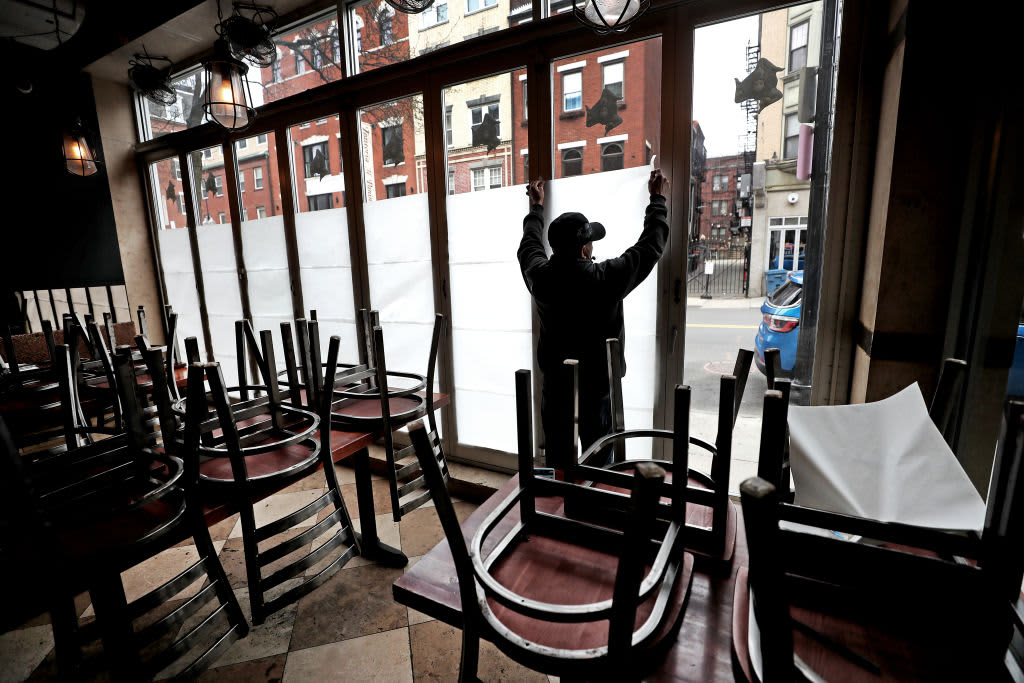As the coronavirus pandemic continues to take its toll on the U.S. economy, a new survey from the National Restaurant Association lays out how dire the situation is for the industry. More than two-thirds of the restaurant workforce, or 8 million employees, have lost their jobs as shelter-in-place orders and mandatory closures have severely impacted the industry’s ability to conduct business.
What’s more, 60% of restaurant owners say that existing federal relief programs, including the CARES Act, which allocated some $350 billion in relief for small businesses under the Paycheck Protection Program, won’t be enough to keep employees on payroll during the downturn.
Restaurants reported $30 billion in losses in March, a projected $50 billion in losses in April, and are teeing up for a $240 billion Covid-19-related loss nationwide by the end of the year. Prior to Covid-19, the industry had been projecting $899 billion in sales this year, with 15.6 million employees, the association said.
In a letter to Congress sent Monday, the group is asking lawmakers to provide targeted relief for the sector, as it says four in 10 restaurants have closed their doors, some with no hope of reopening. Part of its “Blueprint for Recovery” includes a $240 billion Restaurant and Foodservice Industry Recovery Fund.
“The restaurant industry has been the hardest hit by the coronavirus mandates — suffering more sales and job losses than any other industry in the country,” Sean Kennedy, the group’s executive vice president of public affairs, wrote to Democratic and Republican congressional leaders. “On March 18, we wrote you warning of a bleak outlook for the restaurant industry … as the pandemic was unfolding. One month later, we have a clearer picture of the severe challenges that lie ahead, and ask for a focused solution on behalf of an industry that is a vital part of every community.”
One avenue of support for the industry, the Paycheck Protection Program loans under the CARES Act, quickly evaporated, with $350 billion in funding being allocated to just 1.6 million loans in less than two weeks.
The Small Business Administration said there are some 30 million small businesses in America. To meet the sector’s needs, funding of as much as $1.8 trillion may be needed, according to some estimates.
Targeting new funding
Congress is working on an additional round of funding, and advocacy groups such as the National Federation of Independent Business are asking for no less than $200 billion to be allocated for loans for small businesses with 20 or fewer employees. It was recently revealed that big companies such as Ruth’s Chris Steakhouse and Shake Shack were able to access loans under PPP.
Shake Shack announced Monday it would return its loan in the hopes that funding would reach businesses in need after it was able to tap $150 million in equity funding. But a senior administration official told CNBC that while the $10 million Shake Shack returned would go back to the PPP fund, loans can’t be made against the funds until Congress allocates more capital to PPP.
An employee of Carmelina’s in the North End of Boston tapes up paper in the windows of the restaurant, which is temporarily closing during the coronavirus pandemic, on March 25, 2020.
David L. Ryan | The Boston Globe via Getty Images
New data from the NFIB show that three-quarters of small businesses have submitted applications for PPP funding as of April 17, the day after the program reached its funding ceiling. Just 20% had been fully processed with funds deposited in the borrower’s account, while nearly 80% were still waiting, not knowing where they are in the process.
Of the 40% who had successfully submitted an application for an Economic Injury Disaster Loan through the SBA website, 77% requested the emergency grant of up to $10,000. Of those who had requested the emergency grant, about 10% received the funding.
A separate survey from the National Small Business Association finds that just 5% of small business respondents that applied for an EIDL loan have received any money so far, while a quarter of businesses say they’ve received PPP funding. More than 980 small business owners were polled online from April 15-18 for the NSBA survey.
Two-thirds of these business owners are now anticipating a recession within the next 12 months compared with just 14% in January, and nearly half of small businesses are not confident in the future of their business, according to the survey.
In the NFIB survey, a quarter of small business owners expect it to take until 2022 or later for the economy to return to normal.
‘Exasperated’ at loan process
Some entrepreneurs, such as Barry O’Donovan of Kilkenny House in Cranford, New Jersey, said they are “exasperated” by the process, and hearing that big companies accessed funding is maddening.
O’Donovan was seeking a $159,000 loan from his bank, Santander, and said he doesn’t even know if his application was processed. His bank’s manager was unclear, and O’Donovan was told the fund had run dry. He is operating at 70% loss and has gone from a staff of 30 to 9, leading him to make tough decisions regarding layoffs.
“I had to lay off my manager, and some have left because they are making more on unemployment than they are working for me,” O’Donovan said. “The little guy got shafted in this process and got nothing. I am at a loss for words.”
He was relieved, however, to see Shake Shack saying it would return its loan on Monday. “They just got a customer from me — they can get money from anywhere,” he said.
